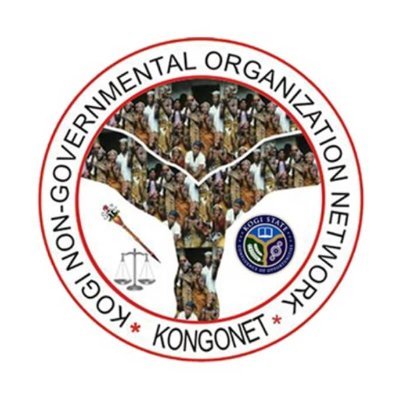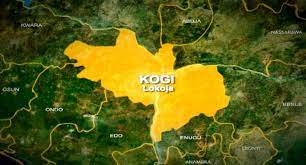 Kogi NGOs Network (KONGONET) is the apex coalition of Civil Society Networks in Kogi State championing the promotion of participatory democracy, good governance/best practices, transparent governance, and network coordination through advocacy and policy influencing for the well-being of Kogites.
Kogi NGOs Network (KONGONET) is the apex coalition of Civil Society Networks in Kogi State championing the promotion of participatory democracy, good governance/best practices, transparent governance, and network coordination through advocacy and policy influencing for the well-being of Kogites.
Kogi State is located in North Central part of Nigeria, created in 1991 from parts of the old Kwara and Benue states, the state undoubtedly is the most centrally located state in Nigeria and serves as a transit state to several parts of Nigeria for instance, Kogi state shares boundaries with ten states. To the North, it shares boundaries with Plateau, Niger, Nasarawa, and the Federal Capital Territory. Benue Enugu and the Anambra States to the East and to the West, it is bordered by Ondo, Kwara, Edo, and Ekiti states.
Though the state is heterogeneous in nature but highly accommodating, it has the Ebira, Igala, and Okun (Yoruba) as the major ethnic group. Other ethnic groupings include Egbura Koto, Bassa Kwomu, Bassa Nge, Oworo, Nupe, Ogori/Magongo, and Kakanda.
Due to her multi-ethnic nature, Kogi state is characterized by very rich cultural values which further shows the uniqueness of each ethnic group in the state, the state is not only blessed with great natural endowments such as large deposits of mineral deposits capable of turning the fortune of the entire country Nigeria around but it also houses very resilient and hardworking manpower who are engaged in various occupation ranging from fishing, farming in various crops on her stretched arable lands.
The state capital, Lokoja, is an ancient historical town that once served as the colonial administrative headquarters of Nigeria. The city is situated on the slope of a range of hills, Mount Patti. It is located at the confluence of the rivers Niger and Benue. It is of great interest to state that Nigeria has christened Lokoja the Kogi state capital after the prominent rivers Niger and Benue.
Politically, Kogi comprises three senatorial districts Western Senatorial District, Central Senatorial District, and Eastern Senatorial District. Consists of nine federal constituencies namely Okene/Ogori-Magongo; Ajaokuta; Okehi/Adavi; Kabba-Bunu/Ijumu; Yagba; Lokoja/Koton-karfi; Idah/Igala-mela/Ofu; Dekina/Bassa and Ankpa/Omala/Olamaboro.
It also has 21 Council Areas: Adavi, Ajaokuta, Ankpa, Bassa, Dekina, Ibaji, Idah, Igalamela/Odolu, Ijumu, Kabba-Bunu, Kogi, Lokoja, Mopamuro, Ofu, Ogori-Magongo, Okene, Okehi, Olamaboro, Omala, Yagba-East, and Yagba-West.
Among the institutions of higher learning in the state are the Kogi State University at Ayingba, Federal University Lokoja, Kogi State Polytechnic, Lokoja, and Federal College of Education, Okene. There are also several private universities and polytechnics in the state as well as adding value to the educational needs of the people.
Today the state celebrates its 31st birthday. It is imperative not only to celebrate her but to look inwards and do a quick evaluation of the journey so far in order to appraise and point out what has worked well so far, the areas of challenges, and possible strategies for overcoming her challenges.
Since its return to democracy in 1999, Kogi state has had five successive transitions with four different Executive Governors (Prince Abubakar Audu, Alhaji Ibrahim Idris, Alhaji Idris Wada, and Alhaji Yahaya Bello) and one acting governor (Chief Clarence Olafemi) manning the affairs of the state and managing the collective resources of the people. Kogi has all it takes to be one of the greatest states, the most developed sub-national unit in Africa, and the commercial nerve center of Nigeria considering what nature has blessed her with, more so that the state is one of the States with numerous resources (human and non-human).
No doubt the state has witnessed giant developmental strides since its creation. The state capital has transformed tremendously from what it was at its inception. Many public edifices now litter the state’s landscape, ranging from roads to Water infrastructures to the educational institutions that we now have. In recent times, the present administration has built on the achievements of the previous government and today new tertiary healthcare facilities are being constructed, an overhead fly-over has also been completed at Ganaja junction in the State capital to the relief of motorists and commuters.
It is however saddening, that the full potential of the state is yet to be harnessed after 31 years of existence. The level of infrastructural development is not commensurate to the population growth of the state despite efforts by successive administrations to improve the lots of the state. There is a need to accelerate development in the Agricultural sector to provide sustainable economic growth and food security. The State government must set aside a minimum of 10% of its annual expenditure to the sector if we as a people must eat what we produce and produce what we eat.
The health sector is also challenged with poor services at both primary and Secondary levels. The majority of our Primary Health Care Centres are not functional. There is an urgent need to ensure that our people get basic services close to their homes rather than traveling to city centers to assess the current new facilities being built.
The current state of our roads (whether federal or state or local) is challenging for our people. Some major Connecting roads within the state capital are in very poor condition and this poses a security risk for the state. The two most critical roads in this aspect are the Hassan Katsina Road and the Ganaja Road. There exist no plausible excuses for the neglect of these roads.
The potential to generate internal revenue and become self-sustaining is present and must be exploited fully. There is a need for the government of the day to sit up, draw a long-term strategic development plan and drive the state to an enviable height.
At 31, Kogi State should be best known for its giant strides in terms of infrastructure and human capital development as against what the present situation of the state is today. Though various governments have in one way or the other done all they can to make life meaningful for the electorates, however, the best is not enough as it has not translated into the realization of the dreams of the founding fathers of the state.
As the Apex coalition of civil society groups in the state, we shall continue to strategically engage the duty bearers on behalf of the good people of Kogi state to demand effective accountability and inclusive governance for all, congratulations Kogites.
God Bless Kogi State.

